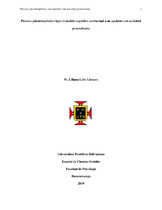Proceso psicoterapéutico bajo el modelo cognitivo conductual a un paciente con ansiedad generalizada
Fecha
2019-05Autor
León Lizcano, Liliana
Director/Asesor
Silva Fernández, Claudia Susana
Tipo de contenido
Especialización
Citación
Metadatos
Mostrar el registro completo del ítemDocumentos PDF
Resumen
El presente estudio de caso se basó en un proceso de intervención cognitivo conductual aplicado a un adulto de 54 años de edad con diagnóstico de trastorno de ansiedad generalizada (TAG). La intervención fue realizada en 13 sesiones diferenciadas en tres etapas: evaluación inicial, intervención psicológica y evaluación final. Durante la etapa de evaluación se utilizaron herramientas como la observación conductual, la entrevista no estructurada, y las pruebas de evaluación: el Inventario Clínico Multiaxial de Millon (MCMI-111) e Inventario de Ansiedad: Estado-Rasgo (IDARE). En la etapa de intervención se utilizaron técnicas del modelo cognitivo conductual como: reestructuración cognitiva, diálogo socrático, relajación progresiva, respiración diafragmática, inoculación del estrés, y entrenamiento en habilidades en solución de problemas. Ante el análisis de la eficacia de la terapia mediante el método pretest y postest del proceso psicoterapéutico, se evidenció como resultados el cumplimiento de los objetivos propuestos, específicamente en la reducción de los síntomas de ansiedad y el mejoramiento del bienestar del paciente. The present case study was based on a process of cognitive behavioral intervention applied to a 54-year-old adult diagnosed with generalized anxiety disorder (GAD). The intervention was carried out in 13 differentiated sessions in three stages: initial evaluation, psychological intervention and final evaluation. During the evaluation phase, tools such as behavioral observation, unstructured interview, and evaluation tests were used the Millon Multiaxial Clinical Inventory (MCMI-111) and the Anxiety Inventory: State-Trait (IDARE). In the intervention stage, cognitive behavioral model techniques were used, such as cognitive restructuring, Socratic dialogue, progressive relaxation, diaphragmatic breathing, stress inoculation, and problem solving skills training. Before the analysis of the effectiveness of the therapy by means of the pretest and posttest method of the psychotherapeutic process, the results of the proposed objectives were evidenced, specifically in the reduction of anxiety symptoms and the improvement of the patientVs well-being.
Palabra/s clave
Cognitivo conductual
Ansiedad
Psicoterapia
Terapia cognitiva
Terapia conductual
Factores ambientales
Colecciones
- Trabajos de grado [6698]
El ítem tiene asociados los siguientes ficheros de licencia:


